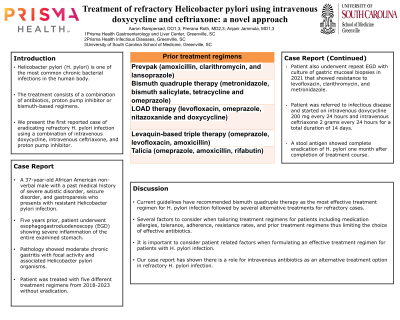Sunday Poster Session
Category: Stomach
P1687 - Treatment of Refractory Helicobacter pylori Using Intravenous Doxycycline and Ceftriaxone: A Novel Approach
Sunday, October 27, 2024
3:30 PM - 7:00 PM ET
Location: Exhibit Hall E

Has Audio
- AR
Aaron Rampersad, DO
Prisma Health Greenville Memorial Hospital
Greenville, SC
Presenting Author(s)
Aaron Rampersad, DO1, Prerana Roth, MD1, Anjani Jammula, MD2
1Prisma Health Greenville Memorial Hospital, Greenville, SC; 2Prisma Health, Greenville, SC
Introduction: Helicobacter pylori (H. pylori) infection is one of the most common chronic bacterial infections in the human body. Patient factors including medication allergies, tolerance, adherence, antibiotic resistance rates, and prior treatment regimens make it difficult for oral therapies to be effective. We present the first reported case of H. pylori eradication using a combination of intravenous doxycycline, ceftriaxone, and proton pump inhibitor.
Case Description/Methods: A 37-year-old African American non-verbal male with a past medical history of severe autistic disorder, seizure disorder, and gastroparesis who presents with resistant H. pylori infection. He was first diagnosed five years prior on esophagogastroduodenoscopy (EGD) showing severe inflammation of the entire examined stomach. Symptoms were abdominal pain and poor appetite per mother. Pathology showed moderate chronic gastritis with focal activity and associated H. pylori organisms. Previous treatment courses from 2018 to 2023 included Prevpak (amoxicillin, clarithromycin, and lansoprazole), bismuth quadruple therapy (metronidazole, bismuth, tetracycline and omeprazole) yet stool antigen remained positive. Subsequent, treatments included LOAD therapy (levofloxacin, omeprazole, nitazoxanide and doxycycline), Levaquin-based triple therapy (omeprazole, levofloxacin, amoxicillin), and Talicia (omeprazole, amoxicillin, rifabutin). Repeat H. pylori stool antigen studies remained positive after each therapy. Patient also underwent repeat EGD with culture of gastric mucosal biopsies in 2021 that showed resistance to levofloxacin, clarithromycin, and metronidazole. Patient’s mother who was present at every appointment confirmed adherence to prior treatment courses. It was theorized that patient’s gastroparesis played a role in poor enteral absorption of antibiotics.
Patient was referred to infectious disease and started on intravenous doxycycline 200 mg every 24 hours and intravenous ceftriaxone 2 grams every 24 hours for a total duration of 14 days. Patient was continued on oral omeprazole 40 mg twice daily. A stool antigen showed complete eradication of H. pylori one month after completion of treatment course.
Discussion: It is important to consider patient related factors when formulating an effective treatment regimen for patients with H. pylori infection. Our case report demonstrated that intravenous antibiotics offers an alternative treatment option for refractory H. pylori.
Disclosures:
Aaron Rampersad, DO1, Prerana Roth, MD1, Anjani Jammula, MD2. P1687 - Treatment of Refractory <i>Helicobacter pylori</i> Using Intravenous Doxycycline and Ceftriaxone: A Novel Approach, ACG 2024 Annual Scientific Meeting Abstracts. Philadelphia, PA: American College of Gastroenterology.
1Prisma Health Greenville Memorial Hospital, Greenville, SC; 2Prisma Health, Greenville, SC
Introduction: Helicobacter pylori (H. pylori) infection is one of the most common chronic bacterial infections in the human body. Patient factors including medication allergies, tolerance, adherence, antibiotic resistance rates, and prior treatment regimens make it difficult for oral therapies to be effective. We present the first reported case of H. pylori eradication using a combination of intravenous doxycycline, ceftriaxone, and proton pump inhibitor.
Case Description/Methods: A 37-year-old African American non-verbal male with a past medical history of severe autistic disorder, seizure disorder, and gastroparesis who presents with resistant H. pylori infection. He was first diagnosed five years prior on esophagogastroduodenoscopy (EGD) showing severe inflammation of the entire examined stomach. Symptoms were abdominal pain and poor appetite per mother. Pathology showed moderate chronic gastritis with focal activity and associated H. pylori organisms. Previous treatment courses from 2018 to 2023 included Prevpak (amoxicillin, clarithromycin, and lansoprazole), bismuth quadruple therapy (metronidazole, bismuth, tetracycline and omeprazole) yet stool antigen remained positive. Subsequent, treatments included LOAD therapy (levofloxacin, omeprazole, nitazoxanide and doxycycline), Levaquin-based triple therapy (omeprazole, levofloxacin, amoxicillin), and Talicia (omeprazole, amoxicillin, rifabutin). Repeat H. pylori stool antigen studies remained positive after each therapy. Patient also underwent repeat EGD with culture of gastric mucosal biopsies in 2021 that showed resistance to levofloxacin, clarithromycin, and metronidazole. Patient’s mother who was present at every appointment confirmed adherence to prior treatment courses. It was theorized that patient’s gastroparesis played a role in poor enteral absorption of antibiotics.
Patient was referred to infectious disease and started on intravenous doxycycline 200 mg every 24 hours and intravenous ceftriaxone 2 grams every 24 hours for a total duration of 14 days. Patient was continued on oral omeprazole 40 mg twice daily. A stool antigen showed complete eradication of H. pylori one month after completion of treatment course.
Discussion: It is important to consider patient related factors when formulating an effective treatment regimen for patients with H. pylori infection. Our case report demonstrated that intravenous antibiotics offers an alternative treatment option for refractory H. pylori.
Disclosures:
Aaron Rampersad indicated no relevant financial relationships.
Prerana Roth indicated no relevant financial relationships.
Anjani Jammula indicated no relevant financial relationships.
Aaron Rampersad, DO1, Prerana Roth, MD1, Anjani Jammula, MD2. P1687 - Treatment of Refractory <i>Helicobacter pylori</i> Using Intravenous Doxycycline and Ceftriaxone: A Novel Approach, ACG 2024 Annual Scientific Meeting Abstracts. Philadelphia, PA: American College of Gastroenterology.
